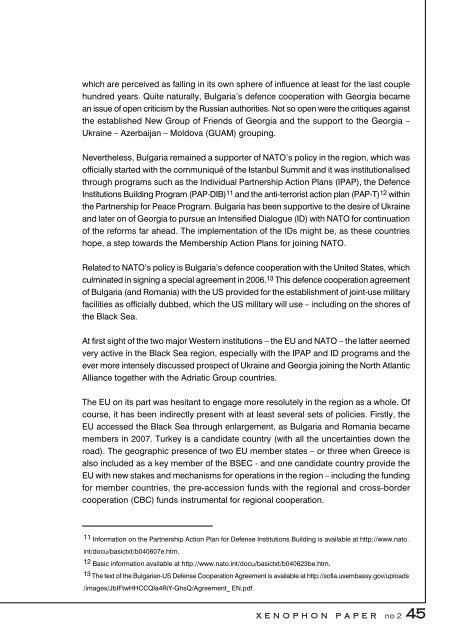Xenophon Paper 2 pdf - ICBSS
Xenophon Paper 2 pdf - ICBSS
Xenophon Paper 2 pdf - ICBSS
Create successful ePaper yourself
Turn your PDF publications into a flip-book with our unique Google optimized e-Paper software.
which are perceived as falling in its own sphere of influence at least for the last couple<br />
hundred years. Quite naturally, Bulgaria’s defence cooperation with Georgia became<br />
an issue of open criticism by the Russian authorities. Not so open were the critiques against<br />
the established New Group of Friends of Georgia and the support to the Georgia –<br />
Ukraine – Azerbaijan – Moldova (GUAM) grouping.<br />
Nevertheless, Bulgaria remained a supporter of NATO’s policy in the region, which was<br />
officially started with the communiqué of the Istanbul Summit and it was institutionalised<br />
through programs such as the Individual Partnership Action Plans (IPAP), the Defence<br />
Institutions Building Program (PAP-DIB) 11 and the anti-terrorist action plan (PAP-T) 12 within<br />
the Partnership for Peace Program. Bulgaria has been supportive to the desire of Ukraine<br />
and later on of Georgia to pursue an Intensified Dialogue (ID) with NATO for continuation<br />
of the reforms far ahead. The implementation of the IDs might be, as these countries<br />
hope, a step towards the Membership Action Plans for joining NATO.<br />
Related to NATO’s policy is Bulgaria’s defence cooperation with the United States, which<br />
culminated in signing a special agreement in 2006. 13 This defence cooperation agreement<br />
of Bulgaria (and Romania) with the US provided for the establishment of joint-use military<br />
facilities as officially dubbed, which the US military will use – including on the shores of<br />
the Black Sea.<br />
At first sight of the two major Western institutions – the EU and NATO – the latter seemed<br />
very active in the Black Sea region, especially with the IPAP and ID programs and the<br />
ever more intensely discussed prospect of Ukraine and Georgia joining the North Atlantic<br />
Alliance together with the Adriatic Group countries.<br />
The EU on its part was hesitant to engage more resolutely in the region as a whole. Of<br />
course, it has been indirectly present with at least several sets of policies. Firstly, the<br />
EU accessed the Black Sea through enlargement, as Bulgaria and Romania became<br />
members in 2007. Turkey is a candidate country (with all the uncertainties down the<br />
road). The geographic presence of two EU member states – or three when Greece is<br />
also included as a key member of the BSEC - and one candidate country provide the<br />
EU with new stakes and mechanisms for operations in the region – including the funding<br />
for member countries, the pre-accession funds with the regional and cross-border<br />
cooperation (CBC) funds instrumental for regional cooperation.<br />
11 Information on the Partnership Action Plan for Defense Institutions Building is available at http://www.nato.<br />
int/docu/basictxt/b040607e.htm.<br />
12 Basic information available at http://www.nato.int/docu/basictxt/b040623be.htm.<br />
13 The text of the Bulgarian-US Defense Cooperation Agreement is available at http://sofia.usembassy.gov/uploads<br />
/images/JbIFtwHHCCQIa4RiY-GhsQ/Agreement_ EN.<strong>pdf</strong>.<br />
X E N O P H O N P A P E R no 2 45









